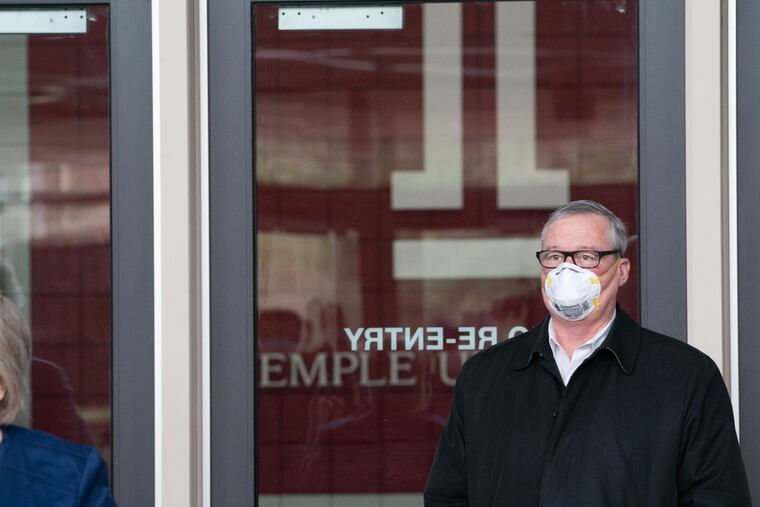Mayor Kenney defends his call for layoffs and tax hikes: ‘Frankly, I’m angry and disappointed, too’
City Council may not support all the tax hikes in Mayor Kenney's revised budget. But Kenney says they're necessary as the city faces a $650 million budget hole.

Mayor Jim Kenney on Friday said his administration made “truly painful decisions” to propose tax hikes, layoffs, and service reductions and fill Philadelphia’s $649 million budget hole, but acknowledged the uphill climb he faces in winning support from City Council and the community.
“This is not what I want for my residents, and I understand if this leaves many of you angry,” he said in a video address. "Frankly, I’m angry and disappointed, too. But after that anger fades, we must remember exactly what we are dealing with. What we have is both a global pandemic and an economic catastrophe.”
Kenney responded to criticism by saying the plan is “not tax heavy,” with the new or increased taxes only generating about $50 million in revenue. Simply trimming expenses and looking to make city government more efficient would not be enough to fill the massive shortfall, he said.
“If anyone thinks there are $650 million in efficiencies, they really don’t know what they’re talking about,” he said at a news conference Friday.
Kenney said the city learned from the Great Recession — when firehouses were closed and debate flared about closing libraries — that public safety and neighborhood facilities must remain open. His budget calls for reducing hours and programming at libraries and rec centers, and he vowed no layoffs in the Fire or Police Departments, and that the firehouses that reopened last year will stay that way.
» READ MORE: Tax hikes, layoffs, and no swimming pools: Mayor Jim Kenney’s coronavirus budget isn’t pretty
But the size of the city’s budget hole in 2009 was $108 million, Kenney noted. It is now facing a potential deficit five times as large.
Council President Darrell L. Clarke expressed concern Friday about Kenney’s proposal to increase property taxes. Councilmembers, who will hold hearings on Kenney’s proposal in the coming weeks in order to pass the budget by July 1, have clashed with the administration over property assessment increases in the last two years that resulted in significant tax hikes for many homeowners.
Clarke acknowledged that some tax increases may be necessary. Kenney’s $4.9 billion spending plan, which replaces a more ambitious $5.2 billion budget proposed in March, also includes increases in the parking tax and the wage tax for suburban commuters, and freezes in planned reductions to business taxes and the wage tax rate for residents.
» READ MORE: Do you still have to pay the Philly wage tax if you’re working from home in suburbs due to coronavirus?
“I like to say that the last thing we as elected [officials] and policymakers should do is stick our hand in the taxpayer’s pocket,” Clarke said, “but there are times that we have to do that.”
Hundreds of city employees will lose their jobs, with some reductions occurring by June; more would follow in August. The city has more than 25,000 full-time employees.
“The hardest part of this budget is having to tell people that they’re going to have to be laid off,” Kenney said. “It’s very heartbreaking, and it’s very difficult.”
Nonunion city employees who make more than $35,000 per year will also receive pay cuts — including Kenney, whose pay will be cut 7%, from $224,183 to $208,490.
Councilmembers may have their own ideas about ways to trim the city’s expenses. They could also add initiatives that would cost the city more money. Councilmembers Helen Gym, Kendra Brooks, and Jamie Gauthier introduced a package of bills on Friday aimed at protecting renters from eviction and rent increases during and after the coronavirus pandemic.
The bills would prohibit rent increases during the pandemic and for a year afterward — essentially implementing temporary rent control in the city — as well as expand protections against evictions, prevent landlords from charging late fees, and create an eviction diversion program.
Not investing in those programs could also cost the city money, the councilmembers said, as more Philadelphians become homeless and need other services.
» READ MORE: Some tenants are calling for a Philly-wide rent strike on May 1. Landlords are holding their breath.
“It’s going to be a discussion,” Gym said. “We believe these opportunities are worth the investment.”
The mayor’s budget plan contains many other proposed cuts to city departments. Some include:
Eliminating the Office of Special Events, the Office of the City Representative, the Office of Arts, Culture and the Creative Economy, and the Office of Workforce Development. Some of the work done by those offices will be shifted to other departments.
Reducing city funding to Mural Arts and the Philadelphia Museum of Art.
Reducing funding to the Commerce Department. Kenney administration officials said they will instead rely on federal programs to help businesses in the city struggling with the impact of the pandemic.
Eliminating internships, hiring and training programs for specific groups, and some professional development programs.
Eliminating funding to launch a rental assistance program for low-income residents, and reducing funding to the Office of Homeless Services. Federal funding will replace city funding for those programs, officials said.
Keeping swimming pools closed this year, canceling special events due to social distancing requirements that would otherwise incur city expenses and police overtime, and canceling this year’s concert series at the Dell Music Center.